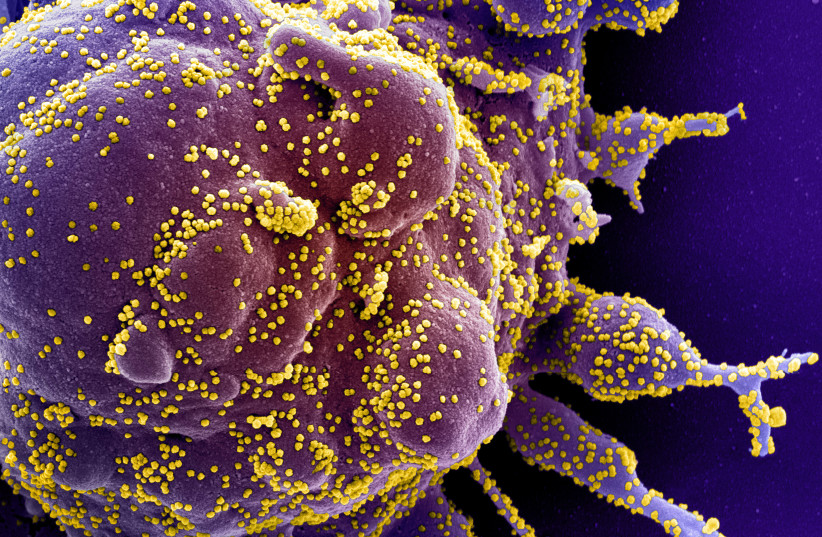In late November 2020, then-opposition MK Naftali Bennett and the Yamina Party he headed were soaring in the polls.
On November 16, one poll predicted he would win 25 seats, another poll three days later had him at 24 seats, and five days later another poll gave the party 23. In the end the party won a paltry seven seats, but in each of those surveys – which were conducted four months before the election – Yamina would have been the second-largest party, had the elections been held then, just a few seats behind the Likud.
Why? Because of COVID-19.
To paraphrase the 1986 Paul Simon song “The Boy in the Bubble,” these were the days of lockdowns and quarantine, everyone was on some kind of Zoom call. The nation was thirsty for someone with answers to the coronavirus. And, again with apologies to Paul Simon, as well as Mrs. Robinson and Joe DiMaggio, “our nation cast its lonely eyes” toward Bennett.
Why Bennett? Because he artfully positioned himself as Mr. Corona.


How? First, as defense minister when the corona pandemic broke, he acted swiftly, with determination and Energizer Bunny-like energy. While others dithered, Bennett acted with alacrity.
He sent the IDF into Bnei Brak to deliver food and medicine to families in quarantine. He opened several quarantine hotels. He deployed soldiers to accompany the police in enforcing lockdowns. He secured the purchase of millions of masks and swabs for tests.
In addition, the Defense Ministry turned a missile factory into a plant for making ventilators, and Bennett was the leading advocate for massive testing and for putting off visits to grandma and grandpa.
The future prime minister’s corona-slaying credentials were augmented by a 133-page Hebrew book he published in the summer of 2020 with the rather overbold title How to Beat COVID-19: The Way to Overcome the Crisis and Lead Israel to Economic Prosperity.
In publishing this book, Bennett seemed to be taking a page out of rival and predecessor Benjamin Netanyahu’s playbook. For Netanyahu published a book in 1987 – with no less a pretentious title – that helped him craft his image as Mr. Security: Terrorism: How The West Can Win.
BUT WHAT both Netanyahu and Bennett undoubtedly realized while sitting in the Prime Minister’s Office is that it is one thing to proffer advice and write a book dealing in theory with the cardinal challenges of the day, and quite another to have the responsibility of dealing with those actual challenges in real life.
In the summer of 2020, while in the accountability-free zone of the opposition backbenches, Bennett said in an interview with the Kikar HaShabbat website, “I can say unequivocally today that the government of Israel has completely lost its control of the pandemic... there is no control, no testing, nobody really knows what is happening.”
In the Knesset, he took to the rostrum and with great pathos screamed at then-justice minister Avi Nissenkorn that the government was doing nothing as people were watching their businesses collapse, and “destroying the lives of millions of Israeli citizens. You are killing them.... What are you doing? Have you gone crazy? Take control of yourselves. There is a nation here that is dying, and don’t dare to blame anyone else – start to work.”
During a Channel 12 interview in the same period, he said that “the eradication of the corona is possible within four weeks” by harnessing the public and with determined government action.
Bennett has been in power now for some 28 weeks, and the coronavirus, in its new Omicron incarnation, is very far from being eradicated.
Asked at a press conference last August – during the height of the Delta wave – whether the title of his book might not have been a bit over the top, and whether he regretted writing it, Bennett replied: “The pandemic gave us all a lesson in humility.”
THE PROBLEM with an ambitious politician writing a book on how to deal with a particular problem, and then on multiple occasions going on record as an opposition parliamentarian and dispensing advice on exactly what needs to be done, is that when that politician ascends to power, it is easy to compare past words and declarations with current actions. And here, what emerges is that while on certain corona-related policies Bennett has proven consistent, on others he has strayed far from practicing what he once preached.
Where has Bennett remained consistent? In his opposition to lockdowns and to very generous financial aid to those financially hit by the pandemic.
Regarding the lockdowns, Bennett opposed them when he was a minister, he wrote against them in his book, and – judging by the current policy of keeping the economy open even as the current variant is running rampant – he remains adamantly against them now. Lockdowns, in Bennett’s view, are the easy answer and evidence of failed policy.
“With all due respect to corona, the real problem is the economic corona – people’s livelihood,” he said in the Channel 12 interview in 2020. His logic was simple: by locking down the country, the government was destroying the livelihood of hundreds of thousands of people. His speeches and interviews were full of passionate speeches about shop owners who couldn’t pay rent or buy bread.
As prime minister, therefore, he has been resolute in doing everything to avoid lockdowns. At a press conference he gave Tuesday evening, Bennett reiterated that the first of the government’s three principles in managing the current wave is to “keep the economy open as much as possible.”
What’s the problem? The problem is that even while there is not officially a lockdown, there is much less human traffic, as people on their own are opting to stay home, and entire industries – the tourism industry, the restaurant industry, the entertainment industry – are either collapsing or hurting badly. But up until now they have not received help from the state as they did under the previous government.
Some of the pathos Bennett mustered when describing businesses collapsing under previous lockdowns could be used now to describe businesses collapsing under the current slowdown.
Bennett declared on Tuesday that the state won’t let the citizens deal with the hardship alone, and that the state will be there “under the stretcher” with them. But don’t expect the same government largesse seen under the previous Netanyahu government.
In his book, Bennett took the government to task for paying months of unemployment benefits, saying that the state has essentially “decided to give citizens fish instead of fishing rods. This is a mistake.” He said that many people “would rather enjoy a year off with 70% of their salary than go out and work for the other 30%.”
So the government’s tightfisted policy, an approach Finance Minister Avigdor Liberman this week inelegantly described as not giving out “gifts,” is consistent with Bennett’s position before he came to power.
One area where there is an inconsistency between Bennett then and Bennett now has to do with airport closures. Israel opened its skies this week, after having had them intermittently closed to tourist traffic for much of Bennett’s term in office. In his book, as well as in an article in The Jerusalem Post in October 2020 adapted from his book, Bennett railed against just such a policy.
In the Post article, Bennett wrote that corona could be an impetus for massive immigration from Western countries, Russia and Argentina, and that Israel should use this crisis to bring hundreds of thousands of immigrants to the country, just as then-premier Yitzhak Shamir did when the Iron Curtain fell in 1990.
“So why is this wave [of immigration] not reaching our shores?” Bennett wrote in the Post. “Because just like the choice of unemployment benefits, the government chose seclusion instead of daring. On March 18 [2020], it was decided to close the country’s gates to anyone who is not a resident or a citizen of the state. The implication of this move is that entry to Jews who are not citizens is prohibited. Thus, Jews who are not citizens who want to set foot in Israel must first complete the full immigration process through the Jewish Agency.”
Bennett added, “To me, closing the State of Israel to Jews in distress is a renunciation of our very essence. Even in the COVID-19 period, Israel can and should be a magnet for Jews from all over the world.”
That was then, before he became prime minister. As prime minister, he has overseen a policy that, for most of the time he has been in office, has kept non-Israeli Jews out of the country.
And then there is the issue of policy clarity, one of Bennett’s main criticisms of the previous government.
“Press conferences run by the prime minister and the health minister are not an alternative to explaining policy, and are not an exact tool in giving over messages,” he wrote in his book. Bennett called for the establishment of a “central authority” that would replace speeches by the prime minister and provide real-time information to the public.
But that is all in theory. In practice, no such central authority to control the corona messaging has been established, the messages are often mixed, and the prime minister constantly uses the press conference to relay corona-related information.
“Time and time again,” Bennett wrote in his book, “decisions were made that were too close to their implementation and did not allow the public to prepare for them – until there were cracks in the public’s trust in the information, and cynicism and contempt for regulations and those who set the regulations penetrated the cracks.”
That paragraph is an apt description of what has happened the last two weeks: unclear information delivered too close to when the regulations were to be implemented, leaving people confused, frustrated and with a sense that no one is in control.
How frustrated are people? A Channel 12 poll this week found that 63% of the public believes that the government’s dealing with the Omicron crisis has been “bad,” while only 34% said it has been “good.” Last July, 52% said “bad” and 39% “good.” The Omicron variant has significantly dented Bennett’s Mr. Corona persona.
Or, as an N12 headline, playing on the title of Bennett’s How-to-Beat-Corona book, put it in August, at the peak of the wave of the Delta variant: “Second edition: How to beat Bennett, by the Delta variant.”
